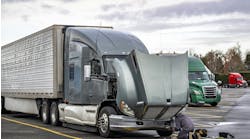The attorney general for the state of Indiana has asked the Federal Motor Carrier Safety Administration (FMCSA) to delay the electronic logging device (ELD) mandate.
FMCSA’s rule requiring nearly all interstate motor carriers to use ELDs to monitor hours of service is scheduled to kick in Dec. 18. The agency granted a number of exemptions, and the Commercial Vehicle Safety Alliance said there would be soft enforcement until April.
However, Indiana’s attorney general said the mandate would place undue burdens on drivers and operators.
“Too many questions surround the mandates with which drivers and operators will be expected to comply. As the deadline for compliance quickly nears, even a cursory perusal of industry trade publications provides clear evidence that many drivers and operators are completely unprepared for the proposed changes,” Curtis T. Hill Jr. wrote to Randi Hutchinson, FMCSA’s chief counsel.
Hill asked FMCSA “to put on hold the new requirements until you are able to develop guidelines that offer greater clarity to the individuals you expect to follow them.”
He pointed out the ELD self-certification process by manufacturers leaves drivers without any way of being certain which devices are fully compliant.
Todd Spencer, executive vice president of the Owner-Operator Independent Drivers Association (OOIDA), said the letter is further evidence of the problems with the ELD mandate.
“This request from a state agency is a prime example how states are beginning to understand the reality of this broadly written mandate and its negative consequences. Law enforcement is simply not ready for this,” said Spencer. “The mandate provides no safety, economic, or productivity benefits for most ensnared by the mandate, which includes businesses that are not in trucking, but rely heavily on trucks as their business models.”



